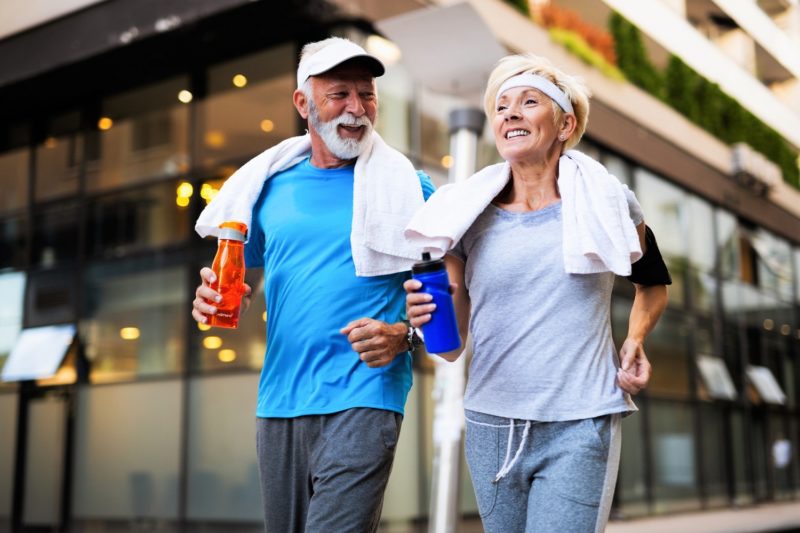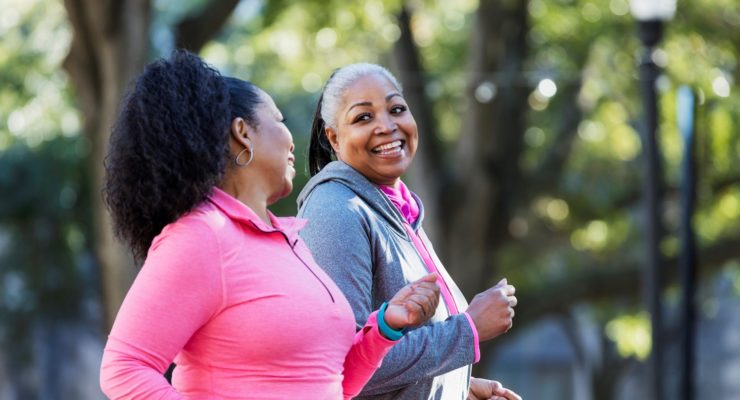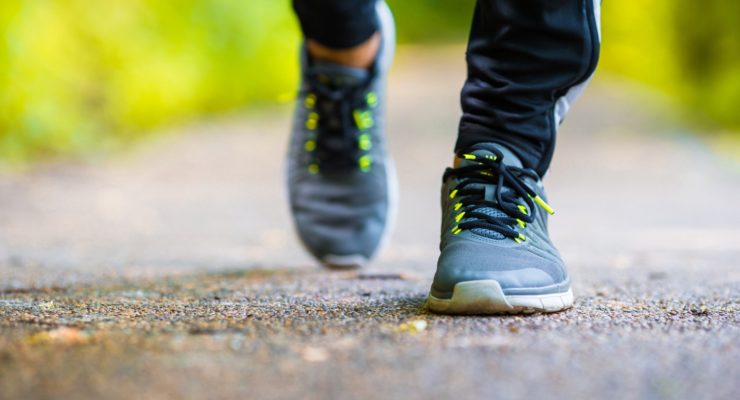5 Warm Weather Walking Tips
Article posted in: Fitness
You already know that walking is good for you. A brisk daily walk can be less taxing on your joints than running and other cardio exercises—but it still gets your heart rate up if you keep a quick pace. Research, published in JAMA Internal Medicine, has also found that averaging 4,400 daily steps per day reduces mortality by 41 percent. And that rate progressively improves up to about 7,500 steps (demonstrating that you don’t necessarily need to hit 10,000 steps to see benefits).
We know that many of our Nutrisystem Success Stories have used walking to help support their weight loss goals. We’ve included many articles about walking on The Leaf to give you new ideas and tips to freshen up your routine.
This has included ways to burn more calories as well as ways to get more steps into your day.
But with the warm weather months upon us, we also want to share some important warm weather walking tips. We know it can be challenging to maintain your walking routine as the days heat up, but we hope that these tips will help keep you on track and safe.
1. Become an Early Bird (or a Night Owl)

Walking in the heat of the day can be challenging. But during the summer months, it can start to heat up fairly early. For that reason, you might consider setting your alarm and hitting the pavement before the temperature has had the chance to rise too much. Oftentimes, summer mornings are still cool. Plus, you’ll feel good about getting your workout done early.
Of course, if you aren’t a morning person—or you already get up early for work—this might not be your best option. Instead, you might consider walking at night.
On either end, if you’re working out while it’s still dark, it’s important to take safety precautions including wearing reflective gear, using extra caution when crossing streets and sticking to the sidewalk.
2. Stay Hydrated

No matter when you walk, it’s always important to stay hydrated if the weather is warm. Drinking water will help prevent your muscles from cramping and will also assist in body temperature regulation—both of which are particularly important during hot summer days.
One of the pitfalls to walking upon first waking up is that people begin their walks dehydrated. Make sure you drink water before leaving for your walk.
We know that it can be a pain to carry a water bottle with you but it’s pretty important—particularly if you’re going to be gone for a while. You might want to look into some of the various fitness water bottles that come with straps or cases for carrying.
3. Keep Cool

Staying cool when you’re working out in the sun is also important. Look for hot weather walking gear such as light-colored and lightweight clothing. You’ll also want to make sure that you have some sort of hat or visor to shade your neck and face. This is also important as a level of sun protection! And of course, you do not want to forget your sunscreen and sunglasses to protect yourself from potentially dangerous sun rays.
Many warm weather walkers also swear by a gaiter or bandana dunked in water and worn around their face or neck to stay cool as the water evaporates.
The fact is that walking is a good low-impact exercise, but keeping a brisk pace could still heat you up. It is a good idea to prepare for your daily walk by getting ahead of temperatures, so that you can maintain the intensity of your exercise.
4. Choose a Shaded Route

You might also want to think about the route that you’re taking and opt for something shaded. If you’re walking in the heat of the day, why not choose a trail where you’ll gain the benefit of shade from the trees? This will likely be a lot more bearable than walking on an open walking trail or in an area where there is no shade, and you have to endure the sun beating down the entire time.
If you know there is a particular part of your walk where you tend to be the most tired, or if you are worried about maintaining a brisk pace to your walk, time the shaded parts accordingly. This will help you keep your energy level up so you can get the most from your daily walk.
5. Know the Signs of Heat-Related Illness

While it’s best to avoid walking at the hottest times of the day because of the increased potential for heat-related issues, knowing the signs of heat-related illnesses can save a life.
Heat stroke, heat exhaustion, heat cramps, sunburn and heat rash are heat-related issues to have on your radar. While you can do a quick online search to understand each of these, know that medical attention should be sought if someone is throwing up, has worsening symptoms, is confused or losing consciousness, has cramps lasting for more than one hour or if a medical emergency is suspected. Speak to your doctor if you have any questions about heat-related illness.
Symptoms can come on suddenly—and because confusion is a symptom of heat stroke, it can be problem that is difficult to self-identify. This is why walking with a buddy is important. Better yet, to stay safe on the hottest days, move your walking time to the early morning or evening hours, switch to an indoor track or find a different way to raise your heartrate for that day!
*Always speak with your doctor before starting an exercise routine.










